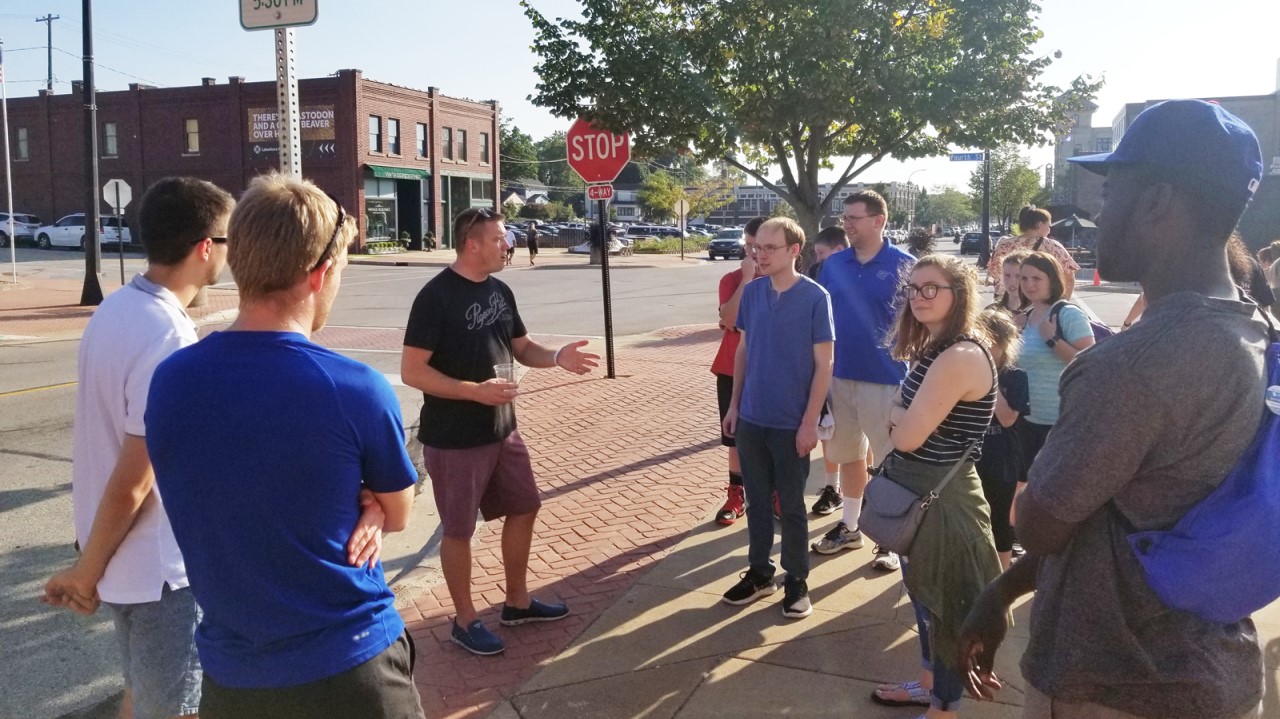
In January 2010, ICMA Student Chapters were created as part of the ICMA Next Generation strategies. The program’s initial goal was to expand ICMA’s long-standing student membership and connect students with a shared interest in the local government profession. ICMA board members, state partners, general membership, and teams within ICMA have helped establish chapters, market the program, and engage with students nationally and internationally.
“I am very proud to be one of the founding supporters of the ICMA Student Chapter at University of South Florida (USF). The USF chapter was Florida’s first when chartered in 2013. It remains one of the top honors in my career that the chapter bears my name. In addition to my personal contributions to the USF Foundation, the city of Auburndale has allocated $1,000 annually since 2013.”— Robert “Bobby” Green, ICMA Life Member and former city manager of Auburndale, Florida
Today, ICMA has 135 student chapters, including 18 international chapters, made up of more than 1,000 student members. Student chapters are student-focused and student-led. They develop their charter, hold regular meetings, engage guest presenters, produce an annual report, and engage with other chapters.
Student chapters help build the leadership pipeline by engaging and developing the next generation of local government professionals. They introduce and integrate students into the local government management profession by familiarizing them with members, resources, and the ICMA Code of Ethics. Student chapters establish strong connections among ICMA, schools, students, state associations, and managers.
Being a student member of ICMA has provided me a community, which has allowed me to gain confidence as I enter local government and public administration. From conversations with city/county administrators and student members at conferences to the educational training provided, these opportunities have helped further my knowledge and skills tremendously. — Khamani “Gigi” Williamson, vice president of Tulane University ICMA Student Chapter
Student chapters are truly a talent pool within ICMA that hasn’t been fully tapped. The profession is experiencing a talent crisis brought on by a retirement tidal wave and years without “building the pipeline.” Statistics indicate that the greatest numbers of retirees come from the managerial ranks, creating significant growth opportunities within the profession.
The workforce retention and recruitment issues that many local communities are facing were made worse by the pandemic shifting our work styles and expectations. Many career candidates are unaware of or choose to ignore the potential career satisfaction that can come from leading a local government through times of innovation and change. At the same time, not enough current public managers consider that they are also responsible for developing young and mid-career talent.
As members of ICMA, we have an obligation to help sustain and grow the profession, and engaging with our student chapters is not only critical to that growth and awareness, but easy and fulfilling. ICMA student chapters have scores of students finishing their MPA/MPP ready to work for your local government, but would benefit from inspiration from seasoned local government professionals—a person that can guide them and provide knowledge to jump start their career in local government. Undergraduate students can also be a member of a chapter or even create their own.
Following are three major ways you can engage with student chapters as an ICMA member:
1. Support a Local Chapter
Consider being the advisor/practitioner for your local student chapter or offer to speak at their meetings. Student chapters face attrition just like local governments. Our network of schools and students is only beneficial in growing the profession if they are active and sustaining. With MPA/MPP programs lasting at most two years, the students that comprise student chapters are continually changing; therefore, the leadership is constantly different.
Having a strong and consistent faculty advisor and practitioner to guide the students each year is crucial. This local leadership of the student chapter is important in guiding each class of graduate students and introducing them to the profession and the community in which the school belongs.
2. Connect with Student Chapters
Connect with student chapters through ICMA’s online platforms, at ICMA conferences, or through your state association. Connections are critical to the local government profession—help a student start building their network!
Whether you are connecting with a student chapter or a student individually, ICMA has a few online platforms that allow you to foster these connections, including ICMA Connect, Who’s Who, and CoachConnect. Technology has allowed us to connect throughout the year, but there is nothing like gathering in person at the ICMA Annual Conference. ICMA provides student-focused events at the conference each year, such as a happy hour, an academic case study presentation, an ethics session, or speed coaching, to name a few.
We encourage you to review the conference schedule when it is released and attend a student-focused session or find an attendee wearing a student ribbon and introduce yourself. These are opportunities to connect with the profession’s future and build that pipeline!
Lastly, connect with students at your state association events. Or, if you notice there is a gap in student representation at your state association, speak up and take action. Student representation at every level is essential!
3. Start a Local Student Chapter
Take charge and reach out to your local university to start their first-ever student chapter. Do you manage a university town? Or does your neighboring community have a university with a well-known MPA program? This is an excellent opportunity to engage the student body with ICMA and introduce them to the local government profession. You can see if the school has a chapter from our online roster of ICMA Student Chapters at ICMA.org/student-chapters.
To start a chapter, you must complete a student chapter agreement and submit a charter. Student chapters need the following items listed on the chapter agreement to form officially:
- A student leader who will serve as the main contact for the chapter (usually a chapter president).
- A faculty advisor (usually a professor in the program, the program director, or another school official).
- A practitioner in the profession, a local government professional in the area (ideally an ICMA member, international member, or affiliate member interested in shared responsibility for the success of the chapter).
There are no fees to start a chapter, and every chapter gets unlimited student chapter memberships. Once the agreement has been submitted, the student chapter has been created and the chapter can begin its work! To learn more about starting a chapter, download our Starting a Student Chapter Toolkit at icma.org/start-student-chapter.
Conclusion
We encourage you to engage with students when you have the chance: start a chapter, support a local chapter, connect as an alumnus with your alma mater, or connect with a student where you see an opportunity. We were all students at one point, and we all remember the mentors that helped us along the way. Learn more about ICMA Student Chapters here.
Thank you to the schools and chapter faculty advisors for their continued efforts to teach local government management and the managers who mentor and advise chapters and students and engage them with the profession and local governments!
Strengthening the HBCU Pipeline
By Joseph D. Fleming III, 2022 Local Government Management Fellow, Pinellas County, Florida
There have only been three historically black colleges and universities (HBCUs) with an ICMA chapter: Clark Atlanta University, North Carolina Central University, and Tennessee State University. I learned about ICMA after being invited to a South Carolina City County Management Association (SCCMA) winter conference that was held near my hometown. I was invited to the conference as a kind gesture to follow up my participation in my first municipal internship the summer before I began at Savannah State. I became familiar with the Municipal Association of South Carolina, SCCMA, and ICMA. I learned about scholarship opportunities, memberships, job opportunities/job boards, and the fellowship.
The underrepresentation of HBCUs actively engaged with ICMA can be attributed to simply not being aware and an issue of proximity. I would define proximity as the positioning to resources, leaders, or advocates. Proximity leads to awareness. It is often said that success is where preparation meets opportunity. But imagine not having access to an opportunity, because it’s not tangible to you. There are a host of challenges and probabilities in pursuing success, but the greatest hurdle may lie in actualization.
Keturah Barnett was introduced to the local government profession through a professor at Tennessee State University who at the time was starting the ICMA student chapter there. Keturah eventually became the president of the chapter, and upon graduation she was selected as an ICMA Fellow for Lancaster, Texas, where she now serves as the assistant to the city manager. Keturah’s story illustrates the importance of the ICMA Student Chapters and the power of proximity. I and others can actualize a career trajectory in local government by seeing her example and what can be achieved when programming, internships, interactions, and mentors are in place.
ICMA is a wonderful organization that is committed to diversity. Proximity calls for mentors and coaches to call or send an email to HBCU faculty explaining the great benefits of ICMA engagement. Proximity calls for state affiliate organizations to contact their area universities, including HBCUs, to establish a relationship. Connecting students with opportunity is of the utmost importance and is beneficial to all involved.

ERIKA COOPER is program manager of career advancement at ICMA (ecooper@icma.org).

JOSEPH D. FLEMING III is a 2022 Local Government Management Fellow with Pinellas County, Florida.
New, Reduced Membership Dues
A new, reduced dues rate is available for CAOs/ACAOs, along with additional discounts for those in smaller communities, has been implemented. Learn more and be sure to join or renew today!
